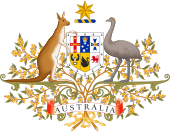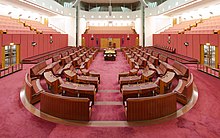
Back مجلس الشيوخ الأسترالي Arabic سێنای ئوسترالیا CKB Australischer Senat German Senado de Australia Spanish Senat (Austraalia) Estonian سنای استرالیا Persian Australian senaatti Finnish Sénat (Australie) French הסנאט האוסטרלי HE Senat Australia ID
Senate | |
|---|---|
| 47th Parliament of Australia | |
 | |
| Type | |
| Type | |
| Leadership | |
| Structure | |
| Seats | 76 |
 | |
Political groups | Government (26) Labor (26) |
Length of term | 6 years (state senators) 3 years (territory senators) |
| Elections | |
| Single transferable vote | |
Last election | 21 May 2022 (Half Senate election) |
Next election | 2024 or 2025 |
| Meeting place | |
 | |
| Senate Chamber Parliament House Canberra, Australian Capital Territory, Australia | |
| Website | |
| Senate | |
| This article is part of a series on the |
| Politics of Australia |
|---|
 |
| Constitution |
|
|
The Australian Senate is the upper house of the bicameral Parliament of Australia, the lower house being the House of Representatives.
The powers, role and composition of the Senate are set out in Chapter I of the federal constitution as well as federal legislation and constitutional convention. There are a total of 76 senators: twelve are elected from each of the six Australian states, regardless of population, and two each representing the Australian Capital Territory (including the Jervis Bay Territory and Norfolk Island) and the Northern Territory (including the Australian Indian Ocean Territories). Senators are popularly elected under the single transferable vote system of proportional representation. Section 24 of the constitution provides that the House of Representatives must have twice as many members as the Senate.
The constitution grants the Senate nearly equivalent powers to the House of Representatives, with the exception that the Senate may not originate or amend money bills, but only reject or defer them. According to convention, the Senate plays no role in the formation of the executive government and the prime minister is drawn from the majority party or coalition in the House of Representatives. However, the government appoints a Senate leader and senators hold senior roles in the government as ministers of state and members of cabinet. Senators from the opposition likewise serve in the shadow ministry.
The Senate elects one of its members to serve as president, who exercises only an ordinary vote and has no casting vote. Since the late 20th century, it has been rare for governments to hold a majority in the Senate and the balance of power has typically rested with minor parties and independents. In practice, this means government bills cannot be assured of passage and regulations may be disallowed. The power to bring down the government and force elections by blocking supply also exists, as happened for the first and thus far only time during the 1975 constitutional crisis. Since major reforms in 1970, the Senate's role as a house of review has increased with the expansion of its committee system.
Senators from states ordinarily serve six-year terms, with half of the Senate up for re-election at each federal election along with the entirety of the House of Representatives. However, there is no constitutional requirement that Senate and House elections occur at the same time; the last Senate-only and House-only elections occurred in 1970 and 1972 respectively. The terms of senators from territories expire at the dissolution of the House of Representatives, typically at three-year intervals. Section 57 of the constitution provides for a double dissolution as a mechanism to break deadlocks between the House and Senate, whereby the entire Senate is dissolved and all seats made vacant.
Casual vacancies are filled by the relevant state or territory parliament, or by the corresponding state or territory government on an interim basis if the parliament is not in session. A constitutional amendment passed in 1977 provides that casual vacancies must be filled by a member of the same political party as the previous senator.
Cite error: There are <ref group=lower-alpha> tags or {{efn}} templates on this page, but the references will not show without a {{reflist|group=lower-alpha}} template or {{notelist}} template (see the help page).
© MMXXIII Rich X Search. We shall prevail. All rights reserved. Rich X Search